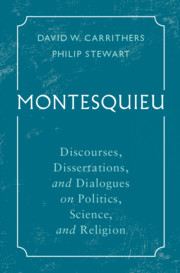2 results
vii - Defense of The Spirit of Law (1750)
-
- Book:
- Montesquieu
- Published online:
- 02 November 2020
- Print publication:
- 19 November 2020, pp 224-263
-
- Chapter
- Export citation

Montesquieu
- Discourses, Dissertations, and Dialogues on Politics, Science, and Religion
-
- Published online:
- 02 November 2020
- Print publication:
- 19 November 2020

